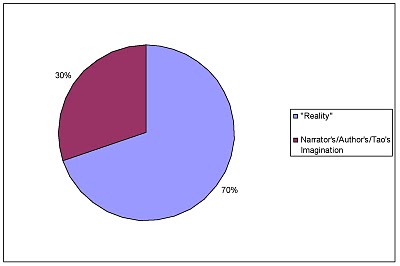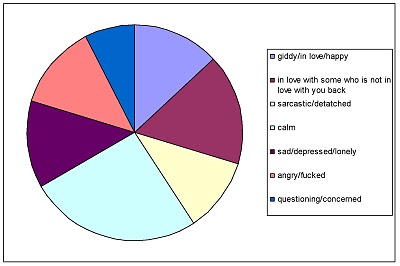 Reading these poems makes me want to write and this is a book that I will probably come back to often when I feel stuck or uninspired. The poems in you are a little bit happier than i am feel genuinely exciting and I would rather read a book that is inspiring and exciting than a book that is not.
Reading these poems makes me want to write and this is a book that I will probably come back to often when I feel stuck or uninspired. The poems in you are a little bit happier than i am feel genuinely exciting and I would rather read a book that is inspiring and exciting than a book that is not.
Introductory Facts
# of poems: 48
# of page numbers: 0
# of times I thought the table of contents was a poem: ~2
Other things I purchased when I purchased this book:
- The Difficult Farm by Heather Christle
- Adventures While Preaching the Gospel of Beauty by Matthew Rohrer and Joshua Beckman (collaborative CD)
Where Do the Poems Take Place?

As illustrated above, the majority of “you are a little bit happier than i am” takes place in “reality,” i.e. within “the world” defined by the book in which things happen concretely. Tao has previously said that this book is, he thinks, “a non-fiction poetry book.” Thus, we, the readers, can take lines like “I emailed people and ate cereal and that took three hours because I took my time” and “on the way home i am driving and i make this very wide turn through this massive intersection; and i am driving very fast and i am a little out of control and while i am making this insane turn, sideswiping across three or four lanes, i look at my mom and i grin at her really big and her face looks a little blank and i feel really happy and really sad at the same time” as things that happen concretely within the book’s “reality.”
Alternatively, a not insignificant portion of the poems take place inside the imagination of the author/narrator/Tao within this defined “reality.” For example, the poem “i want to start a band” follows the title’s premise by elaborating on what the narrator/author/Tao would want his imaginary band to be like. None of the poem “actually” happens, as far as the book is concerned. It’s all in the narrator’s/author’s/Tao’s head. Roughly 30% of the book is like this. This imagination is not limited to statements of desire. It also includes the future tense, conditional statements, and hypothetical situations.
Additionally, these imaginative passages are often complicated by the unreliability of the narrator/author/Tao. Lines, statements, and sometimes large passages are negated with phrases like “just kidding” or “i lied” or, as in the poem “i am about to express myself”: “i want to end my life / i don’t want to end my life anymore / i changed”. This flippancy, besides providing some of the funniest moments in the book, seems characteristic of the “fast-paced, information superhighway” that is, to many, “the modern condition,” which Tao seems to express better than anybody.
These imaginative elements, within the “reality” context, generally seem to serve a therapeutic function for the narrator/author/Tao. Instead of killing his literary agent, a desire expressed in the poem “i am about to kill my literary agent”, the narrator/author/Tao can write a poem about it, thus acknowledging his emotions while using them in a productive way that further detaches himself from violent or self-destructive behavior. In addition, these moments are funny and easy to graph.
What is the Emotional Content of “you are a little bit happier than i am”?

Despite the title and, perhaps, first impressions of Tao Lin, I don’t think you are a little bit happier than i am is a book that conveys overwhelmingly sadness or depression. The narrator/author/Tao seems to treat his feelings and emotions relatively analytically such that the resulting expression of those feelings and emotions is fairly calm and detached. Feelings of sadness, loneliness, and depression are acknowledged in the book; however, they seem to be treated no different from any other emotion, and the existence of these emotions is in some way “life-affirming” in that these emotions exist and the narrator/author/Tao is alive and because he is alive he has these emotions.
How “Identifiable” Do I Think The Poems Are?
To measure this, I established an “Identifiability” Scale, roughly defined as how familiar the poem feels to me situationally, emotionally, or cognitively, and how accurately I think the poem expresses those thoughts/feelings/emotions. (See the “Notes on the Methods” section for a more in-depth explanation of the scale, including basic facts about me to better understand my “demographic.”) Each of the 48 poems received an “Identifiability” Score and these scores were averaged to come up with this index.
Average “Identifiability” Index: 5.86
How “Inspiring” Do I Think The Poems Are? (How Badly Do I Wish I Had Thought of That First?)
This was measured by an “Inspiration” Scale (see “Notes on the Methods” section for a detailed explanation), which is defined as how “inspiring” each poem is to my own writing. “Inspiration,” to me, falls into a few different categories and they are, in descending order of significance (which generally equates to palpability): “damn, I wish I had thought of that,” rhetorical/stylistic/content inspiration, and thematic/conceptual inspiration. Each of the 48 poems was assigned an “Inspiration” Score and these scores were averaged to produce this index.
Average Inspiration Index: 6.53
How Funny Do I Think The Poems Are?
Each poem was given a score (1-10, 10 being the most funny) based on how funny I think the poem is. These scores were averaged across the 48 poems to come up with this “Average Funny Score.”
Average Funny Score: 6.52
How Enjoyable Do I Think The Poems Are?
Each poem was given a score (1-10, 10 being the most enjoyable) based on how enjoyable I think the poem is. These scores were averaged across the 48 poems to come up with this “Average Enjoyable Score”.
Average Enjoyable Score: 6.88
Conclusion
As evidenced by the above measures, this book feels highly identifiable/accurate, inspiring, funny, and enjoyable. I think it’s important to note that I tried as hard as possible to score the poems relative to all of the poetry I’ve ever read as opposed to scoring the poems relative to each other. For comparison’s sake, here are approximate scores for all of the poetry I’ve ever read:
Identifiability: 2.1
Inspiration: 3.3
Funny: 4.0
Enjoyable: 5.0
Additionally, these measures were created for the purpose of reviewing this book, so it’s only natural that this book “performed” above average in these categories. I just wanted to make some points numerically.
Furthermore, a correlation analysis shows that the “Funny Scores” are significantly correlated to the “Enjoyment Scores,” which is perhaps to be expected. However, more interestingly, the “Inspiration Scores” are significantly correlated with both the “Funny Scores” and the “Enjoyment Scores.” I think this is indicative of the way I enjoy poetry. My theory is that the best books are the ones that make you want to write and these correlations seem to prove that.
Tao Lin gets “shit talked” a lot, I think, because his writing style is a highly reproducible/imitatable/infectious one, however I prefer to think of the poems in you are a little bit happier than i am in a more positive, constructive manner. Namely, I see this book as one big writing prompt. Reading these poems makes me want to write and this is a book that I will probably come back to often when I feel stuck or uninspired. The poems in you are a little bit happier than i am feel genuinely exciting and I would rather read a book that is inspiring and exciting than a book that is not that.
Notes on the Methods
Where Do the Poems Take Place? Each poem was assigned as either taking place in “reality” or in the narrator’s/author’s/Tao’s imagination. One poem seemed to take place in both in roughly equal amounts, so it was given a ½ point in each category.
Emotional Content Each poem was assigned 1 to 3 words to describe its emotional content. Each word was counted equally and categorized “post hoc”.
“Identifiability” Scale
| 9-10 | Reading this poem makes me think of an event/situation/thought process from my own life and describes that event/situation/thought process or my feelings about that event/situation/thought process with extreme, almost uncanny, accuracy |
| 7-8 | The majority of the poem feels familiar to me, either situationally or on a line by line basis regarding thoughts/emotions |
| 5-6 | Roughly half of the poem describes things I’ve thought, situations I’ve been in, or feelings I’ve felt |
| 3-4 | I can ‘identify’ with a few lines of the poem |
| 1-2 | I have never or only just barely thought, felt, or experienced the things in the poem |
My “Demographics”
| Age | 23 |
| Occupation | Unemployed |
| College Graduate | Yes |
| Location | New York City |
“Inspiration” Scale
| 9-10 | The poem has directly inspired me to write a poem (e.g. I stoppped reading to write), or the poem invokes a high level of “damn, I wish I had thought of that” |
| 7-8 | I have used specific aspects of this poem’s rhetoric, style, or content, to a high degree, in poems that I’ve written, or the poem invokes a low level of “damn, I wish I had thought of that” |
| 5-6 | Thematic or conceptual aspects of this poem seem have found their way into my poems, or the rhetoric/style/content influence occurs to a low degree |
| 3-4 | Perhaps one or two lines produce a moment of excitement regarding rhetorical/stylistic/thematic/conceptual inspiration |
| 1-2 | I don’t really see anything I want to steal or wish I had wrote |




8 responses
sweet
nice review, bro
i want to read your book
‘the blueprint 2’
why does that picture show up for me?
inspirational
what’s up with these scientific reviews…
but your last one was the blueprint 3 = confused
i’m working backwards
sweet
i’ve read this book. this is a good book. and your data visualization helps me understand what this book is “all about.” i feel like i get its “deal.”
Click here to subscribe today and leave your comment, or log in if you’re already a paid subscriber.